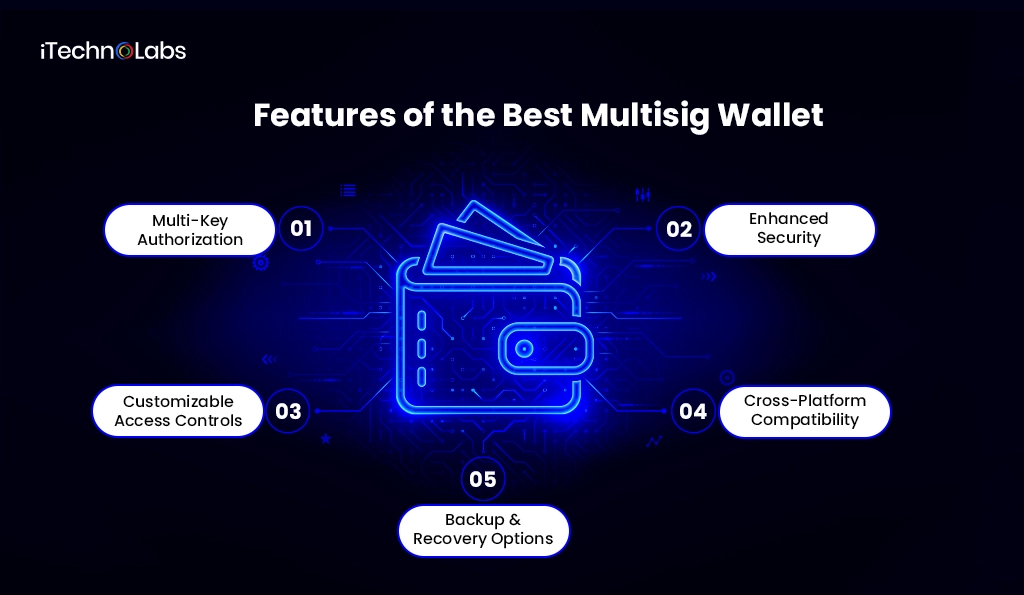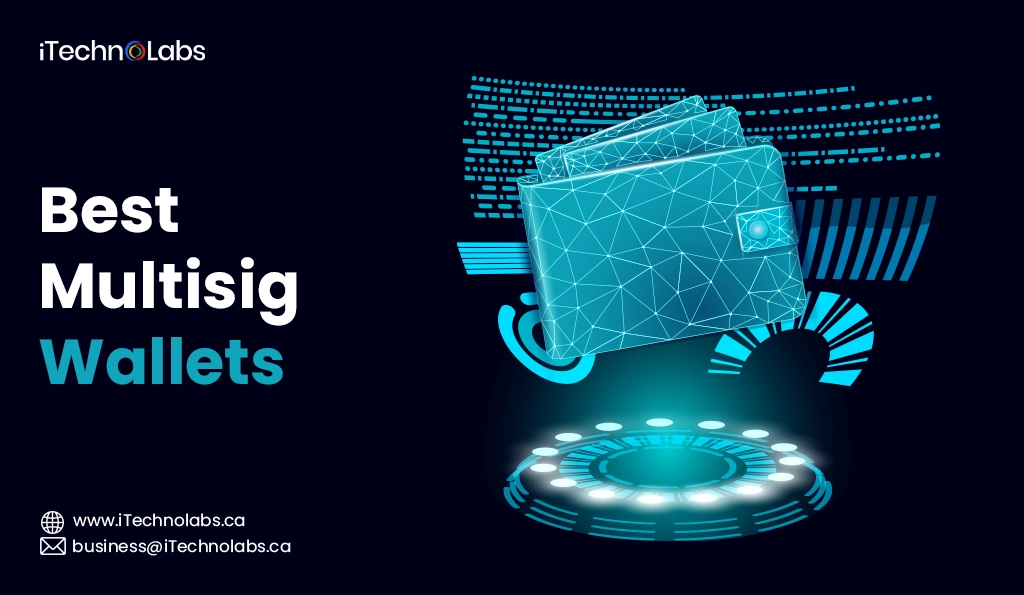A single private key is no longer sufficient to keep your crypto holdings safe. For a company, DAO, or individual investments, the ideal multisig wallet provides that added layer of security by allowing more than one approval before any transaction can take place. With hacks and thefts of cryptos on the increase, multisig wallets are quickly becoming a necessity for anyone who wants safety and control.
In this guide, we’ll discuss the 15 top multisig wallets in 2025 and assist you in finding that delicate balance of security, usability, and functionality.
What is a Multisig Wallet?
A multisig wallet requires two or more private keys to authorize a transaction rather than relying on a single one. Such a possible technological security boost is perfect for companies, DAOs, and individuals who just want to be able to protect their coins from being swiped or lost through accidents. The power of signing transactions being distributed to multiple parties provides a best multisig wallet with greater control, in that no single specific party would have complete dominion and, therefore, reduces the risks involved.
Key Features of the Best Multisig Wallet

-
Multi-Key Authorization
The best multisig wallet needs to have multiple private keys to sanction transactions in order to avoid unauthorized use. One can implement a 2-of-3, 3-of-5, or another signature scheme so that funds cannot be transferred using a compromised key alone.
-
Enhanced Security
Given that multisig wallets require signatures in the multiple form, and multiple signers provide extra security from hacking, phishing or malware attacks, a multisig wallet has a significant advantage. Multisig wallets are a good option for large transactions, because even if one of the keys has been compromised, an attacker cannot spend the funds without extra authorized signers.
-
Customizable Access Controls
Signers may be determined by role—business partners, team members, or family members. No single person has full control over the funds; therefore, there is decentralized decision-making and protection from insiders’ fraud.
-
Cross-Platform Compatibility
The best multisig wallets exist across various platforms, including desktop, mobile, and hardware wallets. This gives the means of safely controlling funds via a smartphone app, browser extension, or bespoke hardware device such as Ledger or Trezor.
-
Backup & Recovery Options
Multisig wallets generally have excellent backup and recovery options if one of the signers will be unavailable: seed phrases or multi-device recovery. For example, if one of the active signers cannot access their key, the recovery workflows allow you to continue to transact without loss of security of the wallet.
Why Do You Need the Best Multisig Wallet for Your Business?
Think about a company dealing with cryptocurrencies where one person controls all the cash. In case they get hacked by phishing or are doing something malicious, your company can lose a lot of money. The best multisig wallet avoids all this from occurring by offering
1. Improved Security
A multisig wallet establishes a greater level of security, since even when one key is breached, unauthorized access will be thwarted and risks of hacking greatly minimized.
2. Fraud Prevention
Multisig wallets ensure fraud prevention by requiring approvals from multiple sources. This limits any single employee or executive from executing unauthorized transactions. This is crucial in the safeguarding of company money against insider fraud or errors.
3. Corporate Governance
Multisig wallets enforce openness because they allow assigned members of the team to collectively approve transactions. This is an appropriate measure of accountability and an indication of business governance policy.
4. Protection Against Human Error
Even experienced professionals can make mistakes. A multisig setup is a safeguard that keeps funds safe in case of unintentional transfers or mismanagement.
5. Trust & Credibility
For businesses with partners, investors, or clients, a multisig wallet demonstrates you are serious about security and transparency, which then builds trust and expands your business relationships in crypto.
How to Set Up a Multisig Wallet?
Installation of the best multisig wallet requires a step-by-step approach in order to offer additional security and easy money management. The following is a step-by-step multisig wallet installation guide for use by your company or you:
-
Select the Right Multisig Wallet
The process starts with the selection of an effective multisig wallet that is most suitable for you. The most common wallets are Gnosis Safe, Electrum, BitGo, and Armory. You must research supported blockchains, security options, ease of use, and hardware wallet support before making a decision.
-
Specify the Signers and Approval Policy
Multisig wallets require authorization from more than one entity to approve a transaction. Decide:
- How many individuals (signers) would be needed?
- What is the minimum number of approvals (M-of-N configuration)?
For example, in a 3-of-5 scheme, a minimum of three co-signers must approve each transaction. Therefore, no transaction can occur without all co-signers approval.
-
Generate and Secure Private Keys
Each participant (co-signer) makes their own private key. They make their own private key to use it to sign their transactions. This private key must be protected using hardware wallets (e.g. Ledger, Trezor) or encrypted (password-protected) storage. You do not want someone else to have access to your private keys.
Lose a private key, and you lose your wallet. So be sure to think through your options for backing them up, such as keeping a secure recovery phrase in more than one place.
-
Set up the Multisig Wallet
Once all the co-signers have their private keys, the multisig wallet needs to be set up:
- Append this multisig wallet with the public keys of all the participants:
- In the wallet user interface, set the approval policy (e.g. 2-of-3 or 3-of-5).
- Make sure to have each of the signers review and agree with how you’ve set up the wallet.
Once all the key pairs have been generated, disregard the wallet provider (some wallets might want you to scan QR codes, have you manually enter public keys, or connect your hardware wallets).
-
Fund the Wallet and Perform a Test Transaction
Prior to complete deployment of your multisig wallet, fund it with a small amount of cryptocurrency to test the configuration. Execute a test transaction to confirm:
- The approval and signing process is functioning as intended.
- All signers are able to approve or reject transactions successfully.
- Funds are safe, and there are no functional problems.
-
Train Users and Monitor Activity
Once you have the wallet installed and operational, ensure all cosigners are knowledgeable about the process to use the wallet. Periodically check for activity and change their security process, and incorporate a recovery procedure so the other parties will know how to recover should one signer lose access.
With thought to the above steps, you should be successful in deploying the best multisig wallet for the best level of security, fraud protection, and low entry on managing your business or personal cryptocurrency assets.
Real-World Examples of Multisig Wallet Use Cases
Multisig wallets are important for protecting digital assets and limiting unlawful transactions. Below are three real-life use cases where people and businesses are using a sophisticated multisig wallet to improve security and efficiency.
1. Corporate Treasury Management
- Use Case: Large businesses dealing with crypto assets often use multisig wallets to prevent internal fraud and mismanagement.
- Example: A crypto hedge fund with millions of dollars worth of digital tokens sets up a 3-of-5 multisig wallet, meaning that at least three executives must approve a transaction to move the funds. This eliminates the risk that any single employee has complete control and also minimizes risks for theft or mismanagement.
2. Decentralized Autonomous Organizations (DAOs)
- Use Case: Decentralized Autonomous Organizations (DAOs) do not have a centralized authority, so they use multisig wallets to hold community funds with a level of safety.
- Example: A DAO for a community-governed DeFi project sets up a 4-of-7 multisig wallet to require that at least four member-elected members approve each withdrawal. In this way, no one can incur a withdrawal without the approval of at least four members, and everyone is kept aware of any changes.
3. Secure Family or Joint Investment Funds
- Use Case: Families or groups investing in cryptocurrencies together might use a multisig wallet to disperse their control so that no one person has access to withdraw.
- Example: A family trust fund wants to invest in Bitcoin and Ethereum and uses a 2-of-3 multisig wallet to do it. The wallet requires at least two family members to approve the transaction, which prevents any one member from taking impulsive action that would endanger the investment.
With the best multisig wallet, companies, DAOs, and families can reinforce security, reinforce accountability, and protect their digital assets from threats both inside and out.
Also, read: Top 15 DeFi Platforms Revolutionizing Decentralized Finance in 2025
Top 15 Best Multisig Wallets for Enterprises
A multisig wallet offers revolutionary security, accountability, and fraud protections, which make them essential products for businesses with a lot of crypto assets. Here are the 15 best multisig wallets in 2025.
1. Gnosis Safe

Gnosis Safe is one of the most secure multisig wallets. With a real safe multi-signature wallet experience, Gnosis Safe is very secure AND user-friendly. Companies can establish a customizable transactional approval process that provides the maximum level of protection of funds.
- How It Works: Uses a smart contract-based multisig that enforces multiple approvals before executing desired actions.
- Why It Stands Out: Open-source, customizable, and functional on various blockchain networks.
- Ideal for: DAOs, institutional investors, and businesses requiring flexible multisig governance.
2. BitGo

BitGo is a multisig regulated custodial wallet, recognized as having better security and complying with financial regulation at an institutional level.
- How It Works: It has multi-party approval requirements for transactions and offers insurance-backed asset protection.
- Why It Stands Out: Provides $250M insurance coverage and supports a wide range of digital assets.
- Ideal for: Large enterprises, crypto exchanges, and institutional investors managing high-value transactions.
3. Casa

Casa is a user-friendly multisig wallet for crypto investors who want some additional security, whether for their business or personal assets.
- How It Works: Uses 2-of-3 or 3-of-5 multisig setups, distributing keys across different devices for added security.
- Why It Stands Out: Provides key recovery options and could allow for cold storage integrations.
- Best for: Businesses, high-net-worth individuals, and long-term holders of crypto.
4. Electrum

Electrum is a reliable and long-established Bitcoin wallet that provides a lightweight multisig option for business use.
- How It Works: It has customizable multisig setups and integrates with hardware wallets from Ledger and Trezor.
- Why It Stands Out: It is extremely fast, lightweight, and secure for single-currency Bitcoin transactions.
- Ideal for: Institutional investors and businesses prioritizing security for Bitcoin.
5. Blockstream Green

Blockstream Green is a full-featured multisig wallet that has sophisticated security features for businesses.
- How It Works: Enforces multisig and 2FA security, making transactions need several authorizations.
- Why It Stands Out: Good emphasis on Bitcoin and Liquid Network assets with support for hardware wallets.
- Best for: Businesses handling Bitcoin and Liquid assets and in need of higher security.
6. CoPay

CoPay is a multi-signature Bitcoin wallet that BitPay built for groups and businesses that have been sharing access to funds.
- How It Works: You can set up a multisig 2-of-3 or more configurations to get transaction approvals from multiple users.
- Why It Stands Out: Fully open-source and simple to use with Bitcoin payment processing.
- Best for: Businesses and teams who control Bitcoin transactions jointly.
7. Armory

Armory is a high-security Bitcoin wallet with support for cold storage and enterprise multi-signature options.
- How It Works: Using offline signing and air-gapped hardware between computers and wallets, it provides maximum security from cyberattacks.
- Why It Stands Out: A very secure multisig wallet with advanced cold storage ability.
- Best for: Businesses and institutions that need ultra-security for Bitcoin assets.
8. SafePal

SafePal is a hardware and software wallet platform with multi-signature transaction support on a number of blockchains.
- How It Works: Empowers decentralized multi-signature approvals while complemented with hardware wallets to ensure further security.
- Why It Stands Out: Provides mobile-first convenience and supports a large variety of crypto assets.
- Ideal for: Companies seeking a mobile-supporting multisig wallet with robust security functionalities.
9. ZenGo

ZenGo is an innovative keyless crypto wallet that uses threshold signatures instead of private keys to minimize possible security concerns.
- How It Works: ZenGo uses Multi-Party Computation (MPC) instead of the traditional multi-signature wallet model.
- Why It Stands Out: The most secure option, without needing private keys, reduces the attacks and user mistakes.
- Ideal for: The company that needs a simple, keyless, secure wallet.
10. Fireblocks

Fireblocks is a business-grade platform particularly made for the handling of bulk transactions under strict regulatory compliance.
- How It Works: Provides a secure platform for processing cryptocurrency transactions with automated processes and real-time monitoring to identify possible threats.
- Why It Stands Out: Institutional-grade security and support of compliance standards.
- Ideal for: Large enterprises handling large sums of money and in need of strong security.
11. Cashmere

Cashmere is a Web3 multisig vault that is built to protect DeFi assets and smart contract transactions.
- How It Works: Provides multi-signature authorization for transactions between Ethereum and other EVM-compatible chains, keeping DeFi transactions safe.
- Why It Stands Out: Is dedicated to managing DeFi assets, having a simple interface for teams.
- Ideal for: DeFi projects, DAOs, and businesses managing digital assets on Ethereum.
12. Coinbase Wallet (Multisig Vaults)

Coinbase Wallet has a multisig vault, allowing businesses to securely hold and manage their crypto assets.
- How It Works: Allows users to set 2-of-3 or 3-of-5 multisig to authorize and approve transactions so funds cannot be accessed without being authorized.
- Why It Stands Out: Allows seamless access to the Coinbase exchange for trading and enterprise users can use its world-class security.
- Ideal for: Companies already trading and managing assets on Coinbase.
13. Cobo

Cobo is both an enterprise and an institution multisig wallet that is non-custodial and custodial.
- How It Works: Supports completely configurable multi-signature arrangements with either hardware wallets or cloud-hosted storage.
- Why It Excels: Designed for business with enterprise-level security and compliance solutions to support organizations with larger amounts of crypto in their possession.
- Best for: Institutional or enterprise investors requiring finesse security features for the custody of digital assets.
14. Exodus (Multisig Integration)

Exodus is a friendly, multi-currency wallet that now accommodates multisig capability through integrations.
- How It Works: Comes with integration with Trezor hardware wallets to allow multi-signature approval of transactions.
- Why It Stands Out: Among the most beginner-user multisig wallets with a user-friendly design.
- Best for: Individuals and business entities looking for an easy-to-use multisig wallet that is supported by hardware.
15. Goki

Goki is a Solana-based multisig wallet created specifically to secure Solana assets.
- How It Works: Supports multi-signature approvals for transactions on Solana’s blockchain for decentralized control over funds.
- Why It Stands Out: Great multisig wallet for Solana-based DAOs, NFT projects, and businesses.
- Perfect for: Organizations and companies on the Solana network.
These 15 top multisig wallets offer first-class security, governance, and operational effectiveness, making them a must-have for companies managing large crypto funds.
Comparison Table
Here’s an in-depth comparison of the best multisig wallets, their release year, advantages, and disadvantages, to guide businesses towards the best wallet to use.
| Wallet | Launch Year | Pros | Cons |
| Gnosis Safe | 2018 | Highly customizable multisig settings
Supports multiple EVM-compatible blockchains Open-source & widely trusted |
Limited mobile support
Gas fees on Ethereum can be high No direct fiat on-ramp |
| BitGo | 2013 | Institutional-grade security
Supports 400+ digital assets Offers custodial & non-custodial solutions |
Requires KYC for business accounts
Expensive for small businesses Not beginner-friendly |
| Casa | 2018 | User-friendly multisig wallet
Hardware wallet integration High-end security features |
Only supports Bitcoin
Expensive membership plans No smart contract compatibility |
| Electrum | 2011 | Lightweight and fast
Open-source with strong community support Customizable security features |
Only supports Bitcoin
Outdated UI No mobile app support |
| Blockstream Green | 2013 | Excellent privacy features
Tor network integration for anonymity Supports Bitcoin & Liquid Network |
Limited coin support
No built-in fiat conversion Advanced setup may confuse beginners |
| Co-pay | 2015 | Multi-platform support (desktop & mobile)
Free & open-source Easy to use for beginners |
Limited active development
No hardware wallet integration Supports limited cryptocurrencies |
| Armory | 2012 | Advanced cold storage options
Fully open-source Great for long-term Bitcoin storage |
Complicated setup for beginners
Only supports Bitcoin No mobile app |
| SafePal | 2018 | Hardware & software wallet support
Affordable hardware wallet option Supports multi-chain assets |
Requires hardware for full security
Less reputation than major wallets Some features are centralized |
| Zengo | 2018 | Keyless security model
User-friendly & mobile-based No private key vulnerability |
Not fully decentralized
Limited advanced security features Higher transaction fees |
| Fireblocks | 2018 | Institutional-grade security
Supports high-volume transactions Compliance-friendly |
Expensive for small businesses
Requires enterprise setup Limited public access |
| Cashmere | 2021 | DeFi-focused multisig wallet
Great for Web3 businesses Supports EVM-based assets |
Limited adoption
Only supports specific blockchains No fiat on-ramp |
| Coinbase Wallet (Vaults) | 2012 | Integrated with Coinbase ecosystem
Easy-to-use for businesses High security & compliance |
Limited control over assets
Custodial by default Not fully decentralized |
| Cobo | 2017 | Institutional security & compliance
Supports multi-layer security Customizable multisig solutions |
High cost for enterprises
Limited personal use features KYC required |
| Exodus | 2015 | Beautiful UI & UX
Supports multiple assets Multisig support via hardware wallets |
Not open-source
Higher transaction fees No built-in multisig (requires integration) |
| Goki | 2022 | Solana-focused multisig wallet
Ideal for DAOs and NFT projects Fast transactions & low fees |
Only supports Solana
Limited adoption outside Solana ecosystem Fewer integrations compared to Ethereum-based solutions |
This table provides a quick comparison of the best multisig wallets, their advantages, drawbacks, and launch years, helping businesses choose the best fit for their security, governance, and operational needs.
Suggested article: Top 15 NFT Real Estate Marketplaces to Follow
How to Choose the Right Multisig Wallet for Your Business
Selecting the best multisig wallet for your business requires careful evaluation of security, functionality, and ease of use. Since multisig wallets are designed to enhance asset protection and governance, businesses must consider key factors before making a decision.
- Security & Reputation: Choose a wallet with a proven track record of security and reliability. Look for encryption standards, open-source code, and institutional-grade security to prevent unauthorized access.
- Supported Cryptocurrencies: Ensure the wallet supports the cryptocurrencies your business frequently uses. Some wallets, like Gnosis Safe and Fireblocks, support multiple assets, while others, like Casa and Electrum, focus primarily on Bitcoin.
- User Access Control: Businesses should assess the wallet’s access control features, ensuring that multiple stakeholders can approve transactions securely. Customizable multisig settings (e.g., 2-of-3 or 3-of-5 approvals) are essential for effective governance.
- Ease of Integration: If your business relies on DeFi, NFTs, or enterprise-grade blockchain solutions, opt for a wallet that integrates seamlessly with Web3 applications, exchanges, and payment gateways.
- Cost & Compliance: Evaluate pricing structures, especially for enterprise wallets like BitGo and Fireblocks, which offer regulatory compliance and insurance options.
By prioritizing these factors, businesses can safeguard their digital assets, reduce risks, and streamline financial operations with the right multisig wallet.
Things to Consider When Choosing a Custom Multisig Wallet Service Provider
Choosing the right custom multisig wallet service provider is crucial for businesses handling large crypto transactions. A well-designed multisig solution enhances security, governance, and operational efficiency. Here are key factors to consider:
- Security and Encryption Standards: The provider must implement advanced cryptographic security, including end-to-end encryption, multi-factor authentication (MFA), and secure key management. Open-source code can add transparency.
- Customization and Scalability: A custom multisig wallet should align with your business model. Check if the provider offers flexible multisig configurations (e.g., 2-of-3, 3-of-5 approvals) and scalability for growing transaction volumes.
- Blockchain and Asset Support: Ensure the wallet supports multiple blockchains and digital assets, especially if your business deals with Bitcoin, Ethereum, stablecoins, or NFTs.
- Regulatory Compliance and Auditability: If your company operates in regulated markets, the provider should offer compliance-friendly solutions with KYC, AML, and audit logging capabilities to meet legal requirements.
By evaluating these factors, businesses can select a custom multisig wallet provider that ensures security, efficiency, and long-term reliability.
Conversion Method to Convert a Wallet to Multisig
Converting a standard crypto wallet into a multisig wallet enhances security by requiring multiple private keys to authorize transactions. The process involves the following steps:
- Choose a Multisig-Compatible Wallet: Select a wallet that supports multisig, such as Gnosis Safe, Electrum, or BitGo. Ensure it is compatible with the blockchain and assets you use.
- Set Up Multisig Configuration: Define the signing policy (e.g., 2-of-3 or 3-of-5) to determine how many signatures are required for transactions.
- Generate Multiple Private Keys: Assign private keys to authorized members, ensuring they are securely stored using hardware wallets or cold storage.
- Migrate Funds: Transfer crypto assets from your existing wallet to the newly configured multisig wallet.
- Test Transactions: Verify functionality by conducting small test transactions before handling larger sums.
By converting to a multisig wallet, businesses and individuals gain enhanced security, fraud prevention, and improved access control over digital assets.
Emerging Trends in Enterprise Crypto Security
As the adoption of digital currencies continues to grow, organizations are focusing on advanced security offerings to secure digital assets. One significant trend has been the global multisig wallet adoption. The purpose of a multisig wallet is to prevent any one party from having full control of the funds, which limits the possibility of hackers taking control of the asset or unauthorized fraud.
A second trend is institutional custodial solutions such as Fireblocks or BitGo, which operate at a higher level of security and offer insured protection and security with compliance-related features.
A third trend is the use of MPC – or Multi-Party Computing – which allows for a transaction to be signed without sharing the private key, considerably lowering security risk.
AI-powered threat detection and real-time transaction monitoring are becoming standard for identifying suspicious activity immediately.
Another developing trend in security is regulatory compliance solutions, which ensure enterprises can operate in a legal framework while keeping funds safe and secure. As businesses continue to adopt these trends, this will greatly improve an organization’s crypto strategy and lower the risk of financial loss.
Important Article: Top 15 NFT Real Estate Marketplaces to Follow
Conclusion
For businesses looking to bolster security, prevent fraud, and take control of digital assets, knowing how to choose the best multisig wallet is essential. As crypto-threats evolve, multi-signature security and enterprise-grade protection are no longer optional; they are a necessity. If you’re searching for a secure and reliable multisig wallet solution for your business needs, consider custom multisig wallet development as a viable option for protecting your assets safely and efficiently.
FAQs
1. Which wallets support multisig?
A few wallets that allow for multisig capability include Gnosis Safe, BitGo, Casa, Electrum, Blockstream Green and Armory. There are many wallets that are now allowing more than one private key to authorize a transaction that are increasing security without putting all private access on one party. Fireblocks and Coinbase Custody are examples of enterprise solutions that offer multisig supported by more than one party for institutional users.
2. Which wallet does Elon Musk use?
Although Elon Musk has not shared the specific crypto wallet he uses, given his take on risk management and security, he is likely to be using a hardware wallet or an institutional wallet with multisig features. Since Tesla has invested in Bitcoin, we assume they will likely be using secure cold storage solutions to manage their assets.
3. Are multisig wallets safe?
Indeed, multisig wallets enhance security by requiring more than one approval before transactions are made, and there are no single points of failure, which diminishes the risk of hacks, theft, and fraud from insiders. However, although multiple approvals are necessary for a successful transaction, their security depends on proper design and implementation. If you lose access to multiple keys, you could forever lock yourself out of your funds.
4. Is Coinbase Wallet multisig?
No, Coinbase Wallet itself does not support multisig functionality. However, Coinbase Custody, a separate service for institutions, offers multisig security features to ensure better fund protection. If you’re looking for a multisig solution, wallets like Gnosis Safe, BitGo, or Casa would be better options.
5. What is a multisig wallet?
A multisig (multi-signature) wallet is a type of cryptocurrency wallet that requires multiple private key approvals to authorize transactions. It is commonly used for businesses, organizations, and high-security setups to prevent unauthorized access, improve asset management, and reduce fraud risks. These wallets enhance security by eliminating single points of failure.
6. What is the best multisig wallet?
The best multisig wallet depends on what you are looking for. Gnosis Safe is likely the most established amongst companies, and BitGo offers institutional-level security. Casa is known for simplicity, and Electrum works superbly well for Bitcoiners. Fireblocks is ideal for enterprise to handle large quantities of funds.
7. How do I get a multisig wallet?
To get a multisig wallet, you need to choose a wallet provider that supports multi-signature transactions, such as Gnosis Safe, BitGo, or Electrum. After setting up the wallet, you will configure the required number of signers, distribute keys, and secure backups to ensure safe fund management.
8. Where can I get a multisig wallet?
You can obtain a multisig wallet from reputable providers such as Gnosis Safe, BitGo, Casa, Electrum, or Blockstream Green. These wallets can be downloaded from official websites or app stores. For enterprise-grade security, Fireblocks and Coinbase Custody offer customized multisig solutions for businesses.
9. What are the disadvantages of multisig wallets?
- Complex Setup: Requires multiple keyholders and a secure setup process.
- Risk of Key Loss: Losing multiple keys can permanently lock funds.
- Slower Transactions: Requires multiple approvals, which may delay transactions.
- Limited Wallet Support: Not all wallets and exchanges support multisig functionality.
- Technical Knowledge Required: Users need to understand how to manage private keys securely.









